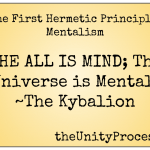
In the original Star Wars trilogy, the light side of the Force puts forth a process oriented vision of peace, while the dark side puts forth an “ends justifies the means” vision of peace. However, in the new movie “The Last Jedi”, both the light and dark sides are conveying the same message to the audience, “be in the moment, and destroy the past” as their vision of peace, as […] Read more »

















